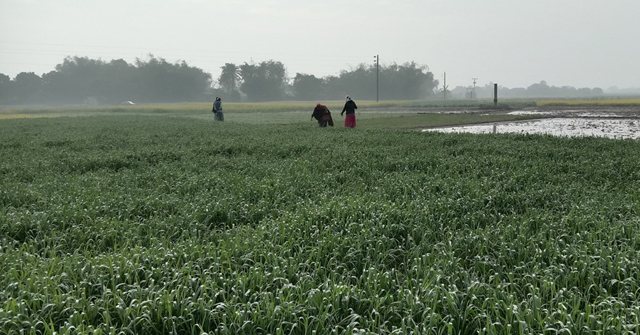
By Dr Md Aynal Haque
RAJSHAHI, Jan 20, 2024 (BSS)- Substantial and sustainable expansion of wheat farming can be one of the best ways of mitigating the existing water-stress condition in the region, particularly the high Barind tract, as wheat is an environmentally friendly crop.
Time has come to enhance acreage of wheat farming instead of depending on only boro rice in this area to ensure food security amid the adverse impact of climate change.
ATM Rafiqul Islam, Manager (Agriculture) of Barind Multipurpose Development Authority (BMDA), mentioned that seven to eight bighas of wheat could be cultivated with the irrigated water of only one bigha of boro rice through soil moisture utilization and the best uses of the modern technologies.
In the conventional system, the single largest constraint requires planting of wheat in the region late in winter, leading to a poor yield. Sowing bed could be a good alternative to the region's dominant wet culture, he said.
He has suggested developing and disseminating appropriate farm machinery like power tiller operated seeder, strip till and zero till, bed planter, reaper and thresher to enhance the farm production especially wheat.
Dr Ilias Hossain, Chief Scientific Officer of Regional Wheat and Maize Research Center (RWMRC), said promotion of modern technologies in wheat farming could be the effective means of boosting wheat yield as a whole.
Disseminating ideas of modern technologies among the field level agricultural officials and farmers on how to expand the wheat cultivation in the drought-prone area has become indispensable.
Dr Ilias says wheat plays an important role to ensure food security as its consumption is increasing day by day. But, Bangladesh produces hardly 10 lakh metric tons of wheat against the demand of around 40 lakh tons annually.
He, however, says Rajshahi region contributes 35 per cent of total area and 44 per cent of total production. Not only that, there are around 50,000 hectares of more rain fed land in the high barind area and there has been a bright prospect of bringing the huge land under wheat cultivation.
Dr Shakhawat Hossain, Senior Scientific Officer of Bangladesh Agriculture Research Institute, says more emphasis should be given on expansion of short duration and high-yielding wheat varieties. Seed preservation and production training need to be strengthened.
GO-NGO collaboration has become an urgent need for the new variety expansion. More support from international research organizations including CIMMYT has become required for germ-plasm especially heat- tolerant variety adoption together with yield gap minimization in the farmers field.
Dr Hossian recommended minimising the constraints for the sake of sustainable wheat production. Farmers needed to be aware about resource conserving technologies and modern scientific methods so that wheat production remained technologically sound, economically viable, socially acceptable and environmentally secure.
Meanwhile, more than 5.64 lakh tonnes of wheat are likely to be harvested from around 1.27 lakh hectares of land during the current season in all eight districts of the division.
Department of Agricultural Extension (DAE) has set the target of producing 3.88 lakh tonnes of wheat from 93,410 hectares of land in four districts of Rajshahi Agricultural Zone, while 1.77 lakh tonnes from 33,676 hectares in four districts of Bogura Agricultural Zone.
The DAE has disbursed seeds and fertilizers free of cost among most of the small and marginal farmers for wheat farming under the government's agricultural incentive programme in the division so that they can boost wheat production.
Rafiqul Islam, a marginalized farmer of Fulbari village under Godagari upazila, said he is very happy after getting the incentives in time.
"I have sown wheat seed on one bigha of land timely after getting the seed and fertilizer incentives," Islam said, adding that the time prior to the end first week of December is considered as an appropriate period for sowing wheat seed.
Various other government and non-government entities have adopted diversified steps to make farming a total success in the region as it's suitable for the crop for its water-saving and drought tolerant features.